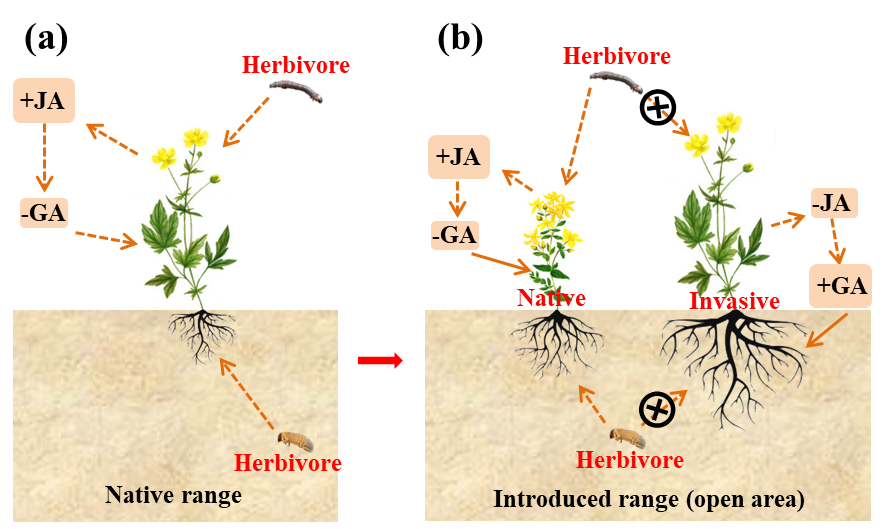Alien plant invasion could generally threaten native diversity, disrupt ecosystem functions and services, and cause large economic damage. Although many studies confirmed that invasive species generally grow faster and larger than native plants, we still lack an understanding of the physiological mechanisms that underlie the greater growth performance by invaders.
To address this issue, Prof. Dr. Yanjie Liu from the Northeast Institute of Geography and Agroecology (IGA) of the Chinese Academy of Sciences, in collaboration with his colleagues Prof. Fei-Hai Yu from Taizhou University proposed a conceptual framework, and also tested part of the framework using a empirical experiment.
Five congeneric pairs of invasive alien plants and native plants was growed under two levels of nutrient availability (low versus high) and treated a half of the plants with a gibberellin biosynthesis inhibitor, paclobutrazol.
Plant can up-regulate jasmonic acid (JA)pathway to against herbivores, so plant will produce low concentrations of JA and high concentrations of gibberellic acid (GA) when experiencing low herbivore damage or no herbivory at all because of the antagonistic cross-talk of JAand GA.
As a result, in native range, plants will produce high concentrations of JA and low concentration of GA, because they experience intense herbivory by both guilds of generalist and specialist species (panel a).
By contrast, in introduced range, invasive plants will produce low concentrations of JA and high concentrations of GA because they escape intense herbivory .
Therefore, invasive plants will grow better than native plants because of growth-promoting hormone GA. The solid orange lines in the figure are the processes what we tested in the present study.
The study indicated that plant below-ground biomass significantly decreased when facing suppression of a plant hormone gibberellin, and this effect was stronger for invasive plants relative to native plants.
The results support the conceptual framework proposed by Prof. Liu, and suggest that plant hormones can differently regulate biomass allocation of invasive and native plants, and thus contribute to the faster growth of invasive plants compared to native plants.
The study entitled "Suppression of a plant hormone gibberellin reduces growth of invasive plants more than native plants" was published in Oikos .

A concept framework presenting how enemy release up-regulate production of a growth-promoting hormone GA and down-regulate production of a defence-related homone JA.
(Imaged by LIU Yanjie)
Contact:LIU Yanjie
Northeast Institute of Geography and Agroecology
E-mail:liuyanjie@iga.ac.cn